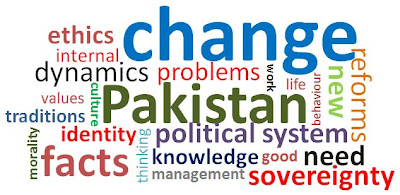by Nadir Mir
To begin with, Pakistan needs reforms. Historically all nations demand reforms. Ironically reforms have been planned and implemented by both evolutionary and revolutionary political systems in the world. The British evolutionary system (except for Oliver Cromwell) since Magna Carter till date has reformed itself continuously and constantly.
The French Revolution 1789, followed by the ‘Code Napoleon’ implemented reforms and the laws of France. Even earlier the American revolution of 1775 was actually a war of independence from the British Crown. What made this a real revolution were the numerous reforms which followed in the newly formed USA. Today, China and Turkey plus other successful economic models have reformed themselves. Both are brotherly states for Pakistan and sources of inspiration.
It is to be considered that Pakistan’s situation and environment is unique. Firstly, Pakistan’s geography is superb. It is pivotally located. The confluence of West Asia, Central Asia, China, South Asia and Indian Ocean is a unique factor. It has the potential of being a ‘bridge state’ or interposing state between these multi-regions. The geo-economic potential through Gwadar lies untapped as yet. Its mineral riches abound (Reko Diq riches alone are estimated at $1 trillion). Its variety of terrain and weather gives it numerous opportunities.
Secondly, Pakistan’s demography of 200 million (by 2015) has immense human potential. Its energetic youth is waiting to be tapped. The Muslim identity and culture synergize with numerous regions. Thirdly, Pakistan’s other assets include a long list of tangible or intangible factors.
Fourthly, Pakistan’s geopolitical situation is improving. Pakistan’s strategic and brotherly ally China is rising. USA is withdrawing from Afghanistan which should, however, rekindle friendly relations with America. Pakistan and Russia are befriending each other as well. Alongside peace talks, trade plans continue with India. Turkey, which is Pakistan’s fraternal ally, is also a rising power.
However, the internal dynamics of Pakistan present a different picture. The nation needs to be united; its political system reformed, economy built and elitism replaced by a welfare society. Militancy, law and order problems need to be resolved. The internal scene is often exploited by foreign hostile forces. In any event, Pakistan’s house needs to be put in order.
The question is what needs to be done and by whom? Pakistan needs to be reformed but who will do it? The conventional political parties with status quo mindsets claim it their democratic right. The change seeking political parties is the second group. Reform seekers form the third group. More revolutionary forces are likely to appear on the national scene in future.
Conventional wisdom holds that a great majority of Pakistani people seek change. Real change can come only through reform. Moreover, before reforms are carried out the basic ingredient of unity has to be achieved or else reforms will not be worth the paper written on.
The political system of Pakistan has two major problems. It is divisive and elections are simply money based. A common perception is that an election costs Rs 10 crore as a conventional estimate. In that case 99.99 percent Pakistanis cannot even dream of fighting elections. It is election by the elite, of the elite, for the elite! Even if some from the middle class do make it, the overall system is elite based. Such a political system is a travesty of democracy. In a true republic, as per the constitution, Pakistan belongs to all the people of this country. Two hundred million Pakistanis by 2015 are shareholders and stakeholders.
Elections are not the question. Who gets elected is the question. Political reform in Pakistan must seek to unify not divide people. Difference of opinion does not mean war within Pakistan. The nation needs peace and unity at home. Secondly, unlimited money spent on politics must be controlled through legislation, media and public opinion building. A vibrant, expressive civil society can prove helpful. If a one dish limit can be placed on wedding meals, some financial limit should be imposed on election politics. Furthermore, foreign funding sources for politics in Pakistan need to be scrutinized. The Pakistani middle class must have opportunity to participate directly in politics. So a more balanced political order could emerge.
Pakistan’s woes emanate mainly from political problems. So it is essential that political reforms are carried out first. Only then will Pakistan be able to emerge as a great nation!
About the Author: The writer is a retired brigadier and has authored a book titled Gwadar on the Global Chessboard. He is a regular contributor to The Fire Within
'Change we need' also published in Nation Monday, January 07, 2013




















0 comments:
Post a Comment